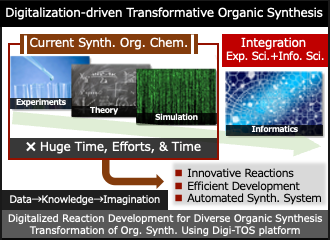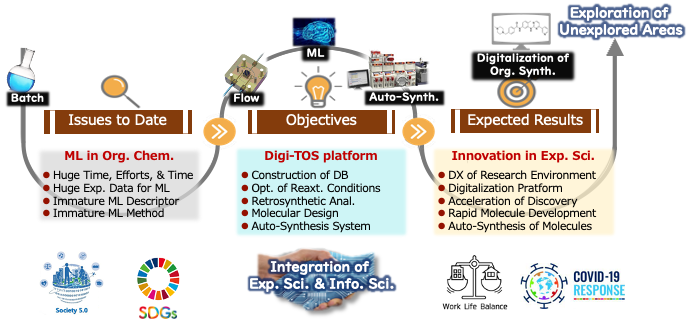Purpose of this research area
Synthetic Organic chemistry, which plays a vital role in Japan’s core industries, is an academic foundation that supports the creation of highly complex molecular systems with super-added value, such as pharmaceuticals, agrochemicals, and functional materials, from easily obtainable and inexpensive organic raw materials. It is said to be the modern alchemy that supports the manufacturing industry, and as demonstrated by numerous Nobel Prize awards, Japan has led the world in this field. Currently, a wave of digitalization is sweeping through the field of organic synthetic chemistry. In order for Japan to continue to lead the world in organic synthesis, it is important and urgent to establish a digital organic synthesis platform (a fusion of experimental science and information science) that will create disruptive innovation in organic synthesis and establish a position that other countries cannot follow.
In this research proposal, we will develop three automated systems for 1) optimizing reaction conditions, 2) exploring synthesis pathways, and 3) designing highly complex molecular systems to construct our unique digital platform that corresponds to the diversity of organic synthesis. We will demonstrate the discovery of innovative fundamental reactions and the super-acceleration (>10 times) of development efficiency. In addition, we will develop a method for converting batch reactions to flow reactions (4), and construct an automatic synthesis system incorporating an autonomous condition optimization unit (5), to demonstrate the industrial practicality of this platform by deploying multi-stage molecular conversion reactions. Our aim is to contribute to the improvement of Japan’s manufacturing capabilities and the continuous development of the chemical industry by creating a great movement that unites industry, academia, and government, and by establishing a research field that aligns with the recommendations of the Japan Academy’s proposal, “Towards new chemical creation through the fusion of chemistry and information science.”

Contents of this area
This project aims to use artificial intelligence (AI) to automate the process of organic synthesis and accelerate the discovery of innovative reactions and molecules. The project will be carried out by three teams, A01 to A03, each with a specific focus on using AI to optimize different aspects of organic synthesis, such as molecular structure design, synthesis pathway exploration, reaction condition optimization, batch-to-flow conversion, and autonomous synthesis systems. The project will also involve developing a unique database optimized for machine learning in organic chemistry to support the development of the automated methods.

【Research conducted mainly by Class A01 (Deepening of Reaction Control)】
Innovative reaction development that reverses essential selectivity.
- Super-acceleration of the discovery and development efficiency of innovative basic reactions through parallel optimization of multiple parameters, 2. Identification of main control factors that regulate reactions (utilizing automated multivariate analysis and deep learning), 3. Understanding and prediction of reaction mechanisms (such as the mechanism of selectivity expression below 2 kcal/mol that is difficult to analyze with quantum chemical calculations). Development of multi-component continuous reactions that produce diverse structures as products. Flow reactionization of developed reactions (conversion from batch reactions to flow reactions). Development of “reaction code modules” corresponding to flow reactions. Verification of designed molecules, catalysts, reactions, and synthetic routes, and provision of actual data.
【Research conducted mainly by Class A02 (Deepening of Synthetic Methods)】
Development of an automatic synthesis system based on the deepening of devices used in flow reactions. Utilizing flow reactions, in-line analysis, robots for organic reaction condition exploration, etc., a system is constructed to quickly collect all experimental data without depending on the experimenter’s environment or expertise. Chemical engineering perspectives: 1. Design, measurement, and control of flow synthesis processes, 2. Development of process data analysis and control systems for automation, 3. Development of methods for converting batch reactions to flow reactions. Construction of batch reactions → reaction code modules → flow reactions → autonomous condition optimization → automatic synthesis process (multistep molecular conversion).
【Research conducted mainly by Class A03 (Deepening of AI Methods)】
Development of three automation systems: 1. Reaction condition optimization, 2. Synthetic route exploration, 3. Molecular design, to support the research of Class A01 and A02. Development of a molecular and reaction representation method (descriptor) that corresponds to the diversity of organic synthesis (diversity of molecular structure and transformation reactions). Construction of a machine learning system that can handle the diversity of organic synthesis. Creation of parameters (algorithms) specific to each reaction (custom-made) and parameters (algorithms) with high generality (ready-made). Construction of a molecular design system that predicts the function of molecules and applies it to the development of pharmaceuticals, functional materials, etc. (verified by experimentation by Classes A01 and A02). Development of a reaction path exploration system. By utilizing domain-specific information such as chemical selectivity, it is possible to explore short-step synthesis routes without protective groups and present reaction conditions adapted to individual substrates.
Expected Outcomes and Significance
The promotion of research in this field not only leads to the rapid discovery of new reactions and principles and the swift creation of innovative molecules but also brings about a “transformation of the research environment” in organic synthesis. The research environment for organic synthesis, which has been carried out at great time, effort, and cost, is expected to shift to a low-cost, short-term, and low-effort research environment through the development of automated methods that thoroughly utilize artificial intelligence (AI) to eliminate waste, allowing human intelligence to focus on more creative tasks. It is believed that this will lead to a strengthening of the “digital organic synthesis” research environment, which can continue research under any circumstances, rather than relying solely on experimental research in the post-COVID-19 research environment.
To continuously develop this interdisciplinary fusion research not only during the five-year period of the research project but also thereafter, we plan to construct our own “Digital Organic Synthesis Platform (PF).” We aim to make this PF available to a wide range of fusion research fields after the completion of the research project and are preparing for database maintenance and authentication measures.

